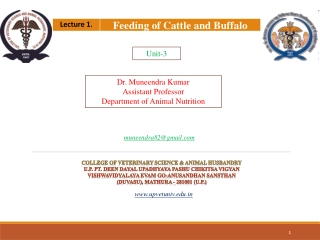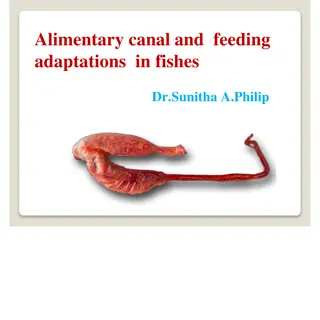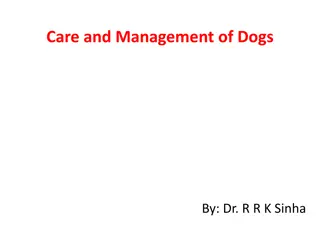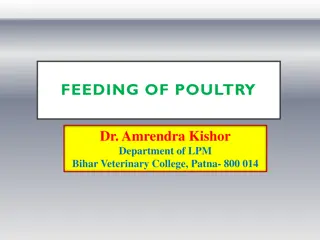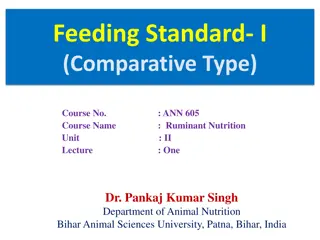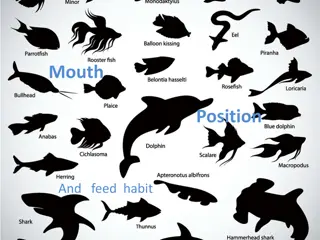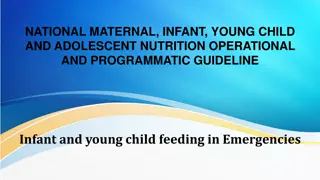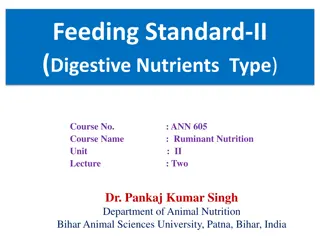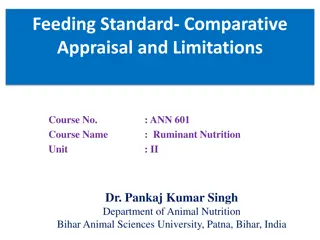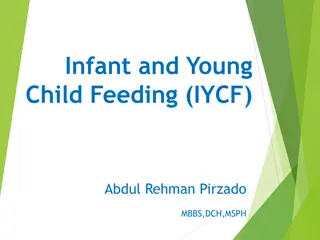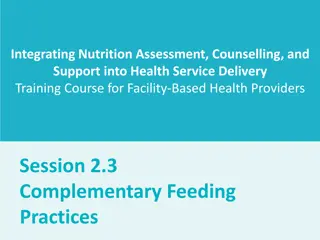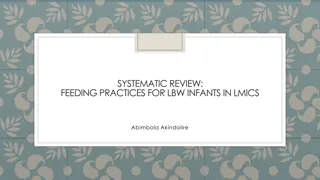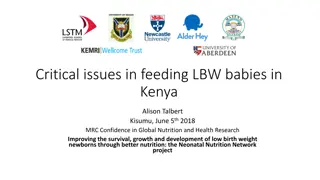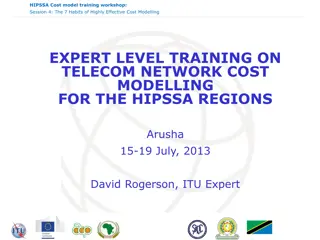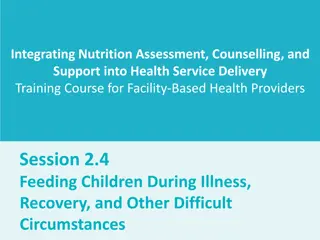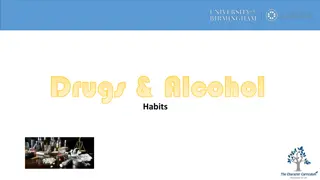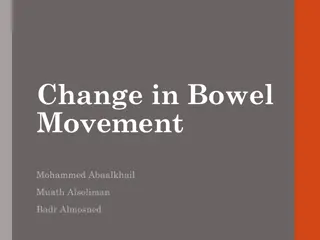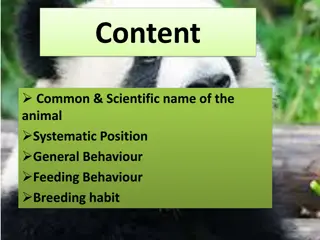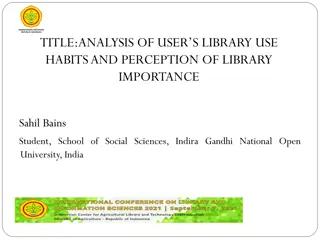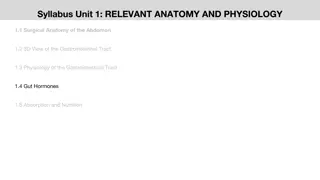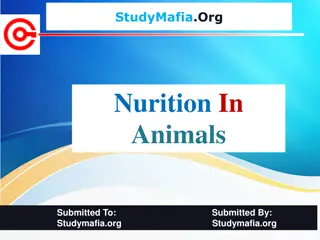Feeding of Cattle and Buffalo
Explore the key concepts of ration formulation for feeding cattle and buffalo, focusing on balanced nutrition, ingredients, characteristics of a good ration, and best practices to ensure optimal health and productivity. Learn from Dr. Muneendra Kumar, Assistant Professor at the Department of Animal
0 views • 58 slides
BSD Spring 2023 Challenge Summary
Participants in the BSD Spring 2023 Challenge shared feedback on the tools that were most helpful, barriers they faced, positive changes made to wellness habits, and their confidence in continuing these changes. The 4-week challenge encouraged healthier lifestyle choices, including managing stress,
0 views • 10 slides
Understanding Composite Fish Culture for Increased Productivity
Composite fish culture involves stocking different fish species with varying feeding habits in the same pond to optimize space and resources. This method allows for the utilization of all niches in the pond, leading to assured production and easy management. The article covers the species involved,
6 views • 16 slides
Guidance on Hospice Care and Feeding Tubes for Elderly Patients
Learn about the appropriateness of hospice care for a 74-year-old female with heart failure and the use of feeding tubes for an 89-year-old female with advanced Alzheimer's dementia. Understand important considerations for palliative care decisions.
4 views • 125 slides
Alimentary Canal and Feeding Adaptations in Fishes by Dr. Sunitha A. Philip
The presentation discusses the alimentary canal and feeding adaptations in fishes, covering topics like the different regions of the gut, mouth types in fish, adaptation of teeth for specific diets, and the roles of the buccal cavity, pharynx, and gill rakers. It further explores how gill rakers var
0 views • 24 slides
Comprehensive Guide on Dog Care and Management
Learn about housing, feeding, and dimensions of kennels for dogs, along with tips on appropriate feeding that plays a crucial role in keeping dogs healthy and fit. Dr. R.R. K. Sinha provides valuable insights on the care and management of dogs, emphasizing the importance of suitable housing, feeding
0 views • 42 slides
Essential Guidelines for Feeding Poultry for Optimal Production
Feeding poultry is a crucial aspect of poultry production, accounting for a significant portion of total expenses. Quality feed and proper feeding methods are key to maximizing efficiency. Understanding the nutritional needs of poultry, including water, carbohydrates, proteins, fats, vitamins, and m
1 views • 18 slides
Developing Good Reading Habits in Secondary Education
Explore the importance of developing good reading habits in secondary education, focusing on extracting specific information from texts and using language items effectively. Understand the difference between good and poor reading habits, learn how to set reading goals, assess progress, and enhance r
0 views • 12 slides
Understanding Feeding Standards and Their Objectives in Livestock Nutrition
Feeding standards provide tables indicating nutrient quantities necessary for livestock based on various physiological functions like growth, maintenance, lactation, and more. Objectives include guiding farmers in selecting balanced rations and classifying functions for individual animal needs. Glos
2 views • 13 slides
Understanding Fish Mouth Positions and Feeding Habits
The position of a fish's mouth reveals valuable information about its feeding habits, behavior, and lifestyle. Fish mouths can be categorized as superior (upward-facing), terminal (forward-facing), or inferior (downward-facing), each adapted for specific feeding strategies. Superior mouths are ideal
5 views • 10 slides
Infant and Young Child Feeding in Emergencies: Operational Guidelines
Infant and Young Child Feeding in Emergencies (IYCF-E) focuses on protecting and supporting safe feeding practices for infants and young children during all types of emergencies to reduce mortality and morbidity risks. Key actions include developing policies, training staff, coordinating operations,
4 views • 10 slides
Evolution of Feeding Standards for Ruminants: A Historical Perspective
The evolution of feeding standards for ruminants dates back to the 19th century, with pioneers like Grouven and Wolff introducing various criteria based on nutrient types and digestibility. Despite initial shortcomings, subsequent refinements by researchers like Professor Kuhn and Atwater have shape
0 views • 18 slides
Understanding Feeding Standards in Ruminant Nutrition
Feeding standards play a crucial role in determining the nutritional needs of animals for optimal health and productivity. They consider factors like productivity, product composition, and physiological conditions, guiding effective nutritional management. Despite their usefulness, feeding standards
0 views • 8 slides
Empowering Yourself in the Workplace Through Positive Habits
Explore the concept of self-empowerment in the workplace by understanding how habits shape your professional identity. Discover positive and negative workplace habits and learn to take charge of your destiny through conscious decision-making. Engage in a workplace habits exercise to assess your habi
2 views • 21 slides
Sheep and Goat Clinic: Feeding, Exercising, and Show Preparation Tips
Topics covered in the Sheep and Goat Clinic include feeding strategies (last 90 days), the importance of balancing fat levels, exercising routines leading up to show day, and final points on feeding and fat management. The images provide valuable insights on feeding athletes, understanding fat level
0 views • 20 slides
Global Impact of Infant and Young Child Feeding (IYCF) Strategies
Global strategies like Infant and Young Child Feeding (IYCF) developed by WHO and UNICEF aim to address the high mortality rates among children under 5 due to malnutrition. The strategies emphasize the importance of appropriate feeding practices during pregnancy, lactation, and early childhood to co
0 views • 14 slides
Integrating Nutrition Assessment and Counselling: Complementary Feeding Practices
This training course focuses on educating facility-based health providers on complementary feeding practices, emphasizing the importance of introducing solid foods along with breastfeeding at 6 months. The session covers topics like nutrition gaps in breast milk, optimal feeding principles, and util
0 views • 48 slides
Feeding Practices for LBW Infants in LMICs
Improved survival rates of small babies highlight the importance of nutrition for LBW infants. Research into feeding practices in LMICs is crucial for promoting growth and development. Studies compare formula milk to human milk, exploring effects on growth, development, morbidity, and mortality. Evi
0 views • 21 slides
Importance of Feeding Infants with Breast Milk and Iron-Fortified Formula
Breast milk and iron-fortified infant formula are recommended for infants to meet their nutritional needs and support optimal development. Breast milk offers numerous health benefits, protecting infants from illnesses and reducing the risk of obesity. Iron-fortified formula is a suitable alternative
0 views • 23 slides
Challenges in Feeding Low Birth Weight Babies in Kenya
Addressing critical issues in feeding low birth weight babies in Kenya, including the lack of accurate birth weight measurements, preterm birth rates, and the risks associated with formula milk feeding. Strategies such as promoting expressed breastmilk and supporting mothers in neonatal units are di
2 views • 15 slides
Guidance for Complementary Feeding in Infants
After 6 months of age, breastfed infants may struggle to meet their nutrient needs from milk alone, necessitating the introduction of complementary foods. Implementing guiding principles can help ensure optimal nutrition and growth, including exclusive breastfeeding for the first 6 months, practicin
0 views • 18 slides
Understanding Dugongs: Marine Chordates of the Ocean
Dugongs, known as sea cows, are fascinating marine chordates with a broad but fragmented range in tropical waters. They exhibit social behaviors, communicate through echoing sounds, and are herbivorous grazers feeding on seagrasses. Breeding season rituals involve courtship behaviors like vocalizati
0 views • 7 slides
The Fascinating World of Sponges: Structure, Feeding, and Reproduction
Explore the incredible world of sponges, from their unique structure with tiny pores to their feeding habits straining food from water. Learn about sponge larvae, reproduction through sexual and asexual means, and discover the wonders of these ocean-dwelling organisms.
0 views • 8 slides
Expert Training on The 7 Habits of Highly Effective Cost Modelling
In this workshop session by David Rogerson, an ITU expert, participants learn the key habits of successful cost modelling in the telecom industry. The session covers identifying, illustrating, remembering, and implementing these habits for effective regulatory cost-modelling practices, with a focus
0 views • 23 slides
Assisting with Oral Feeding, Dysphagia Management, and Enteral Tube Feeding in Healthcare
This content covers essential aspects of assisting with oral feeding for individuals at risk for aspiration, managing dysphagia with specific recommendations and diet progression, and enteral tube feeding procedures and complications. It emphasizes safety, dignity, and independence in feeding practi
3 views • 12 slides
Assisting with Enteral Tube Feeding and Dysphagia Management
This content covers essential information on assisting with oral feeding for patients at risk of aspiration, managing dysphagia, diet progression, and enteral tube feeding procedures. It emphasizes safety, independence, and dignity in feeding practices. The content includes tips for preventing aspir
0 views • 12 slides
The Power of Habits and Routines in Biblical Examples
Understanding the significance of habits and routines through the examples of Daniel in prayer and Jesus' teachings on prayer. Reflects on how habits shape our spiritual growth and direction. Encourages cultivating positive habits for spiritual development.
0 views • 35 slides
Integrating Nutrition Assessment and Counseling for Child Feeding During Illness
This training session focuses on the importance of feeding children during illness and recovery, discussing feeding practices and options in difficult circumstances. Participants will learn strategies to encourage children to eat during challenging times, emphasizing the goal of continuing feeding r
0 views • 32 slides
Ration Formulation and Feeding Practices for Dairy Cattle and Buffaloes
This informative article discusses the importance of colostrum feeding, milk feeding to calves, and milk feeding schedules for dairy cattle and buffaloes during various phases. It emphasizes the significance of timely colostrum intake for immunity development and the proper feeding of whole milk or
0 views • 20 slides
Understanding Habits, Addiction, and Ethical Dilemmas
Explore the complexities of habits, addiction, and ethical decision-making through thought-provoking scenarios and real-life stories. Delve into the challenges of breaking habits, the virtues required for change, and the impact of role models in addiction prevention. Reflect on moral dilemmas and co
0 views • 6 slides
Understanding Changes in Bowel Habits and Irritable Bowel Syndrome (IBS)
Changes in bowel habits can indicate underlying conditions like Irritable Bowel Syndrome (IBS), which affects millions worldwide. Learn about the symptoms, diagnosis, and management of IBS through practical examples and multiple-choice questions. Discover how psychological treatments like cognitive-
0 views • 58 slides
Giant Panda - Overview of Behavior, Feeding, and Breeding Habits
The Giant Panda, scientifically known as Ailuropoda melanoleuca, is a unique animal belonging to the Carnivora order. They exhibit solitary behavior but communicate through various means. Despite being classified as carnivores, they primarily feed on bamboo shoots. Breeding habits include mating bet
0 views • 9 slides
Analysis of Users' Library Use Habits and Perception of Library Importance
Libraries play a crucial role in educational institutions by supporting teaching, learning, and research. Understanding users' habits and perceptions is essential for efficient library services. This study focuses on exploring students' library use habits and analyzing their perceptions of library i
0 views • 15 slides
Discovering Reading Habits: A Fun Survey on Books and Leisure
Uncover your reading preferences with this engaging survey! Explore how you spend your free time, your book format choices, book-buying habits, family reading traditions, and more. Dive into the world of reading habits and see where you fit in the spectrum of book lovers.
0 views • 20 slides
Understanding Re-feeding Syndrome: Metabolic Alterations and Pathophysiology
Re-feeding Syndrome (RS) is a critical condition characterized by severe metabolic changes during the repletion of underweight or malnourished individuals. The syndrome's hallmark is severe hypophosphatemia, leading to multisystem complications. This summary delves into the biochemical basis of RS,
0 views • 25 slides
Understanding the Role of Gut Hormones in Regulating Feeding Behavior
The syllabus covers relevant anatomy and physiology related to the gastrointestinal tract, emphasizing the regulation of feeding processes. It discusses the role of gut hormones such as ghrelin, obestatin, cholecystokinin, pancreatic polypeptide (PP), and peptide YY (PYY) in controlling appetite, en
0 views • 7 slides
Group Visit for People With High Blood Pressure: Session 7 Habits
Session 7 of the group visit for people with high blood pressure focuses on reviewing guidelines for a healthy diet and activity habits, sharing health goals, and troubleshooting with peers. The session includes videos on eating and activity habits, discussions on making small changes, and planning
0 views • 15 slides
Florida International University Affiliate Center - Transforming Schools through Habits of Mind
Florida International University Affiliate Center, led by Co-Founders Bena Kallick and Art Costa, focuses on cultivating thinking and Habits of Mind in schools. Through feedback spirals and 16 identified habits, the center aims to create a generation of individuals who can thoughtfully address globa
0 views • 7 slides
Understanding Nutrition in Animals: Types and Process
Nutrition in animals is vital for their survival, with various categories like herbivores, carnivores, and omnivores. Different modes of nutrition include filter feeding, deposit feeding, bulk feeding, fluid feeding, and suction feeding. The process of nutrition involves ingestion, digestion, absorp
0 views • 14 slides
Promoting Healthy Eating Habits in European Schools
Encouraging responsible eating habits and addressing the increasing issue of obesity among European students through a cooperation project focusing on evaluating diet quality, the ecological impact of food habits, and rediscovering traditional gastronomy. The project aims to raise awareness, share g
1 views • 25 slides
